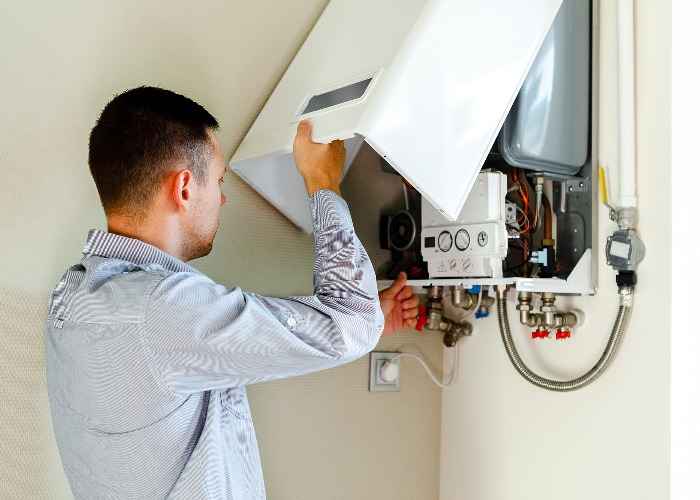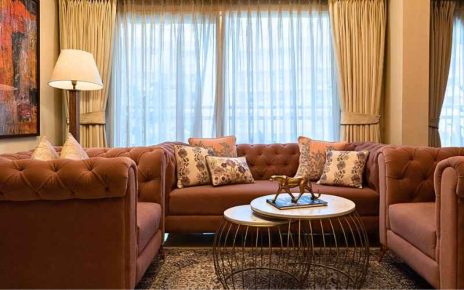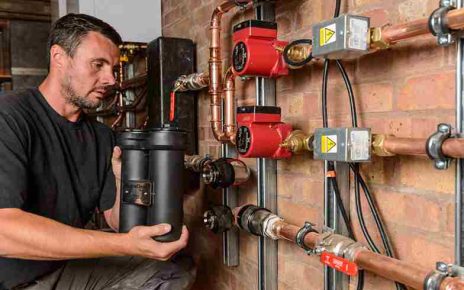Probably you are in the market, looking for a new boiler and you are planning to opt for a Combi Boiler this time. But how good a choice that would be for you would depend on certain factors.How much heating or hot water you require, the intensity of your usage, how many users are there in your home, and how much extra space you have all matter to find out whether any boiler type is suitable for your home or not. So before you make your next boiler purchase, there are a few things you should know about boilers. Boilers are of 3 types in the UK, namely Conventional Boiler, System Boiler, and Combi Boiler. However, the latter has gained the most popularity in the UK market, which we are going to discuss in this blog.
What is a Combi Boiler?
A Combi Boiler, better known as a Combination Boiler is a unit that does both the job of a central heating unit and a water heater. Combi Boilers can provide hot water as per demand. And it also does not need a hot or cold water tank for its function.
Now, let’s discuss the pros and cons of a Combi Boiler:
Pros of a Combi Boiler
Competitive Installation Cost: Combi Boiler installation does not involve putting up any hot or cold water tank, like that of any other type of boiler. Being a compact system, it also makes the engineer put less pipework during installation, which reduces the overall hassle and cost during installation. Moreover, you can hardly get the problem of freezing pipes in Combi boilers, as there’s no cold water tank or pipe with it.
More Fuel Saving: Combi Boilers are more energy efficient, mostly because they heat water “on demand”.Unlike Regular or System boilers, it does not require heating up a huge cylinder of water, even in times of small requirements of hot water. Out here, you just need to turn it on and then the hot water faucet. Eventually, it prevents huge energy wastage caused due to repeated heating.
Gives Instant Service: For Regular or System boilers, you need to wait for some time to heat up the hot water cylinder. But that’s not the thing with Combi boilers. As it provides hot water on demand, you don’t get that waiting time for its service.
Requires Less Space: Combi boilers are compact heating units with no hot water tanks, no cold water tanks, and minimal pipeworks. Thus it frees up a lot of space in the loft, once allotted for huge water tanks and airing cupboards for hot water cylinders. Thus, these boilers are great for small homes, flats, or houses with a shortage of space.
More Cleaner System: In Combi boilers, you don’t have any water tanks, where water is kept for a prolonged period of time. Thus, there’s no possibility of water getting contaminated with dirt and sludge in the tanks. Instead, that water comes directly from the mains, which makes it completely fit for drinking.
Less Carbon Footprint: Being an energy-efficient unit, a Combi boiler not only saves you on your fuel bills but as it burns less fuel, it discharges less carbon. This is definitely a very eco-friendly unit. And with the increasing industrialization, your approach to opt for a Combi boiler or rather a condensing combi boiler is crucial.
Better Availability of Spare Parts and Skilled Professionals: As Combi boilers are more popular in the UK, you will not face any hard time in finding a skilled gas engineer for these boilers. Moreover, as its spare parts are easily available in the market, it will also ease the job of your gas engineer to fix your boiler.
Cons of Combi Boiler
Depends on Main Water Pressure: Combi boilers, mostly fail to handle the high demand of water in one go. As its flow rate mainly depends on the mains water pressure, gas engineers nowadays first analyze that, before they start up the installation process. And at times, if they find the pressure of water in the mains too low, they even suggest you not opt for Combi boilers.
No Hot Water Storage: As there is no backup storage of hot water in Combi boilers, that often causes a problem during breakdowns. In such a scenario, you are left with no hot water supply in your home.
No Heating & Hot water on Breakdowns: Combi boiler is a single unit that takes care of both the heating and hot water supply. So what can happen if this system fails? Eventually, you will be left with no heating and hot water supply. However, as an alternative, you can use a water immersion heater to provide you with hot water.
More Complicated Mechanism: Combi boilers, being more efficient and updated are a far more complex unit, possessing many electronic devices and chips, So if there’s any issue with your boiler, the gas engineer will more likely take quite a dear time to fix it.
Can not handle Multiple Users at a time: If it’s a large house with multiple bathrooms where more than one person might open the hot water faucet or shower at the same time, Combi Boiler is not the right fit there. Might be you are using the washing machine or the dishwasher or have someone using the shower, and there might be hardly any chance of hot water coming out of the basin tap. The absence of any hot water tank and low mains water pressure might be the reason behind it.
However, in spite of these drawbacks, Combi Boilers are getting widely accepted because of their wonderful benefits of updated technology and eco-friendliness. But at the end of the day, your boiler should fulfil the requirements of your home. So, it’s not always about getting the best one, but the right one.
Anyways, if you still have doubts about your boiler installation. please feel free to consult a registered gas engineer in Essex from Golden Plumbing & Heating Ltd.





